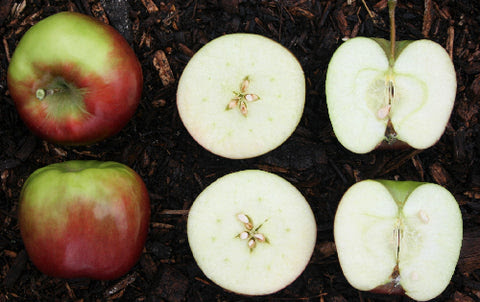Apple Cider Vinegar (ACV) is everywhere. Everybody talks about it - either for its potential to aid in weight loss or control blood sugar levels.
Apple Cider Vinegar is not a new concept. It is a very popular food ingredient, especially in the western kitchen. It has been used in salad dressings, beverages, or as a marinade, among other things. It has also been used for centuries as a home remedy for many health problems, courtesy its anti-microbial and antioxidant properties. Apple Cider Vinegar may also aid in weight loss, reduce cholesterol, lower blood sugar levels, and reduce the risk of diabetes. Let’s take a look at what it is and what are its health benefits.
What Is Apple Cider Vinegar (ACV)?

Apple Cider Vinegar (ACV) is fermented apple juice made from crushed apples. It mainly contains acetic acid and citric acid which give vinegar its strong sour smell and flavour. Along with it, it may also contain various vitamins, minerals, dietary fibre and antioxidants.
How Is Apple Cider Vinegar Made?
Apple cider vinegar is made in the following way.
- First, yeasts are added to crushed apples, which ferments the sugars and turns them into alcohol.
- Next, bacteria are added to it to further ferment the alcohol, turning it into acetic acid — the main active compound in vinegar.
- ACV contains 5–6% acetic acid.
Unfiltered ACV is called mother. It contains a few strands of proteins, enzymes, and gut-friendly bacteria that give the product a cloudy appearance. It is believed that mother ACV is responsible for most of its health benefits.
Apple Cider Vinegar Health Benefits
Control Diabetes: ACV can help in keeping the high blood sugar levels in
the normal range. Many research studies have suggested that vinegar significantly lowers the blood sugar level by improving insulin sensitivity and insulin response levels.
Dosage – 20ml (4tsp) mixed with 200ml water. Consume every day before a major meal (Breakfast, Lunch, Dinner)
Help in Weight Loss: Many human studies show that ACV may contribute to weight loss by promoting satiety (feeling of fullness), lowering high blood sugar, and reducing insulin levels. Promoting satiety means you tend to eat fewer calories and hence lose weight. ACV also is low in calories, contains about 3Kcal/15ml.
Dosage- 15-30ml ACV with water. Drink before heavy meals daily.
May Improve Heart Health: Studies suggest that ACV can lower the cholesterol level, triglyceride levels, as well as several other heart disease risk factors such as reduced blood pressure which is a major risk factor for heart disease.
Dosage- 10-15ml every day with water.
Boost skin health: ACV is commonly used for skin conditions like dry skin, rashes, infection, and eczema. ACV can help rebalance the natural pH of the skin, improving the protective skin barrier. Also, its antibacterial properties, help prevent skin infections which are linked to eczema and other skin conditions.
Dosage – Dilute in water and externally apply on skin.
Relieve in Polycystic Ovarian Syndrome (PCOS) Symptoms: PCOS is a hormonal condition associated with abnormal menstrual cycles, high levels of androgen hormones, ovarian cysts, and insulin resistance. A research 
study found that women with PCOS drinking ACV post-dinner, may have improved hormone levels and experienced more regular periods.
Dosage- 1 tbsp. (15ml) add in 150 ml water and consume post-dinner daily.
Improve Digestion: ACV increases the acidity of the stomach, which helps your body create more enzyme pepsin (that breaks down protein).
Dosage - 15–30 ml with water immediately before any heavy-proteins meals.
Frequently Answered Questions About Apple Cider Vinegar
Here are a few FAQs regarding apple cider vinegar.
Are there any benefits of consuming Apple Cider Vinegar?
Apple cider vinegar has many benefits that include weight loss and blood sugar management, food preservation, or its usage as a natural hair conditioner and skin toner. Furthermore, it is used to get rid of dandruff, wash vegetables and fruits, treat skin warts, or use as a dish detergent. It is known for its antibacterial properties because of which it is used as a disinfectant as well. Additionally, it is also known to improve digestion, reduce insulin sensitivity, detoxify the liver and internal organs, and improve metabolism, among other things.
How often can I consume Apple Cider Vinegar?
How much and how often you consume apple cider vinegar depends on the reason for which you are having it. Most people consume somewhere between 15 ml to 30 ml of apple cider vinegar before having their lunch and dinner to enjoy its benefits. Try out Wellbeing Nutrition's raw, unfiltered and unpasteurised Apple Cider Vinegar with 2x the mother to naturally boost your overall wellbeing.
Are Apple Cider and Apple Cider Vinegar the same thing?
No apple cider and apple cider vinegar are different from one another. Apple cider, which is sometimes also referred to as sweet cider or soft cider, is the juice that is obtained from pressing apples. The filtered version of this cider is known as apple juice.
On the contrary, if the cider is unpasteurised, natural yeasts from the apple skins or the ambient air will result in the cider fermenting, causing the natural sugars to convert into ethyl alcohol and carbon dioxide. This is known as hard cider. When a certain type of bacteria called acetobacter is added to hard cider, in the presence of oxygen, the alcohol in it will get converted into acetic acid, which lends vinegar its characteristic tang. This is how apple cider vinegar is produced.
Is Apple Cider Vinegar considered an alcohol?
No, apple cider vinegar is not an alcohol. ACV is prepared by crushing apples and squeezing out the juice. However when bacteria and yeast are added to the juice, the fermentation process begins, which converts the sugars to alcohol. In the next round of fermentation, the alcohol is further converted into vinegar by a particular species of bacteria, known as acetobacter.
TAKE AWAY
ACV has been used in cooking and as a preservative for thousands of years. But it has other several health benefits too, including weight loss, blood sugar control, improved digestion, and reduced risk of heart disease. In short, you should try ACV because it’s almost calorie-free, adds lots of flavour to food like salads, and has many health benefits.
Reference:
- Therapeutic effect of apple cider vinegar on diabetes mellitus, Rawal Medical Journal, 2019,(https://www.researchgate.net/publication/337784029_Therapeutic_effect_of_apple_cider_vinegar_on_diabetes_mellitus)
- Is Vinegar an Effective Treatment for Glycemic Control or Weight Loss?, Jill Balla Kohn, MS, RDN, LDN, Journal of the Academy of Nutrition and Dietetics, 2015, (https://jandonline.org/article/S2212-2672(15)00547-X/fulltext)
- Study About The Nutritional And Medicinal Properties Of Apple Cider Vinegar Article Info Abstract, Singh Akanksha and Sunita Mishra, Asian Journal of Science and Technology, (https://www.researchgate.net/publication/322953260)
- Beneficial effects of Apple Cider Vinegar on weight management, Visceral Adiposity Index and lipid profile in overweight or obese subjects receiving restricted calorie diet: A randomized clinical trial, Solaleh Sadat Khezri, Atoosa Saidpour, Nima Hossein zadeh, Zohreh Amirib, Journal of Functional Foods, 2018, https://doi.org/10.1016/
j.jff.2018.02.003 , (https://www.sciencedirect.com/science/article/abs/pii/ )S1756464618300483 - Analysis of microbial diversity in apple vinegar fermentation process through 16s rDNA sequencing, Juan Song, Ji‐Hong Zhang, San‐Jiang Kang, Hai‐Yan Zhang, Jing Yuan, Chao‐Zhen Zeng, Fang Zhang, and Yu‐Long Huang, Food Science and Nutrition, 2019, doi: 10.1002/fsn3.944, (https://www.ncbi.nlm.nih.gov/pmc/articles/PMC6475731/)
- Effect of apple cider vinegar on delayed gastric emptying in patients with type 1 diabetes mellitus: a pilot study, Joanna Hlebowicz, Gassan Darwiche, Ola Björgell, and Lars-Olof Almér, BMC Gastroenterology, doi: 10.1186/1471-230X-7-46, (https://www.ncbi.nlm.nih.gov/pmc/articles/PMC2245945/)
- Intake of vinegar beverage is associated with restoration of ovulatory function in women with polycystic ovary syndrome, D. Wu, F. Kimura, T. Murakami, 2013, DOI:10.1620/TJEM.230.17, (https://www.semanticscholar.org/paper/Intake-of-vinegar-beverage-is-associated-with-of-in-Wu-Kimura/06d58e72698939f16badcd22b9a60f072c402c91)




























 DOWNLOAD NOW
DOWNLOAD NOW
